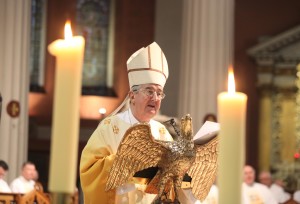
By Sarah Mac Donald - 25 December, 2013
 Christmas is not just a day, it is a way of life, Archbishop Diarmuid Martin of Dublin said in his homily for Midnight Mass on Christmas Eve.
Christmas is not just a day, it is a way of life, Archbishop Diarmuid Martin of Dublin said in his homily for Midnight Mass on Christmas Eve.
Addressing the congregation gathered in St Mary’s Pro Cathedral in Dublin, the Archbishop warned that politics and economics had to be at the service of people.
“Their true effectiveness is to be discerned and measured – before, during and after austerity – in how they respond to the needs of the poor and the marginalised,” the Archbishop said.
Addressing the needs of the poor and the marginalised is not just about the politics of poverty or even of doing things for the poor, Archbishop Martin commented.
“It is about identifying ourselves with true poverty, about a life of self-giving rather than a life of self-aggrandisement or accumulating wealth,” he suggested.
Speaking about Christmas Eve, the Primate of Ireland said that there were “parents with meagre means who are bringing happiness to their children with small gestures.”
He also noted that on Christmas Eve and Christmas Day the loneliness of many who live on their own will be brightened up by someone who calls on them while the hearts of many mothers and fathers will be warmed up by a long-awaited phone call from a sadly-missed son and daughter who had to emigrate.
“Christmas is a Feast of humanity and what is best in humanity,” he said.
He emphasised that the story of Jesus’ birth was not “just a nice fairy tale.”
Rather, Archbishop Martin told the congregation, it was about the harshness, sinfulness and the self-centredness which exists in human hearts which Jesus came to change.
He said these could so easily be institutionalised and consolidated into structures in society which entrap and imprison.
“Church and State have separate roles; faith does not impose any particular political or social order. Politics and economics are never an end in themselves.”
He continued, “Harshness and corruption and disregard can become consolidated in any model of society, numbing or replacing that vision of the prophecy of Isaiah” in relation to lifting up the yoke that is weighing on our brothers and sisters, breaking the bars which weigh heavily across their shoulders, and removing the rod of oppression and abandonment which frustrates their aspirations.
The leader of the Church in Dublin reminded the congregation that the God revealed in Jesus Christ was not “the God of the magic-wand who turns the challenges of life, Cinderella-like, into a fairy tale.”
“Jesus tells us that being human is about being really authentic. If the only cold and snow we really encounter at Christmas is the cotton wool and spray of the shop windows, then we miss the message of Jesus and our lives will remain within the artificial and superficial.”
He added, “If we perfume away the deeper realities of what life is about – our own lives and the lives of those around us – then we reject the love of God revealed in Jesus Christ which alone can save us and change us.”
Discussing the shepherds who came to the stable in Bethleham on that first Christmas night, the Archbishop said these “shepherds are not the tinselled shepherds of our Christmas cards: they are rough and dirty. They were considered impure and were excluded from the worship-life of the community.”
The essence of our humanity is not to be found in any self-created comfort zone, where the harshness of life is covered up or placed conveniently out of sight or where the rawness of human relationships is romanticised in superficiality.
Christ brings people together to think differently about who we are as individuals and as the family of humankind.
Commenting that “Christmas spontaneously releases generosity”, Archbishop Martin again expressed his thanks for the “wonderful response” to his Crosscare Food Bank appeal.
“Crosscare received over 70 tons of food: nothing of luxury, but simple basic food for families who might otherwise not have had enough to eat in these days,” he said.
“These are our neighbours, not just in the broad theological sense; they are indeed our next-door neighbours, people living in this city and in this diocese,” he concluded.